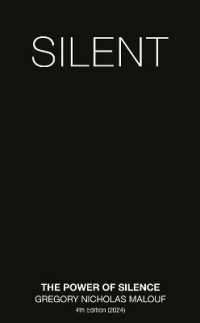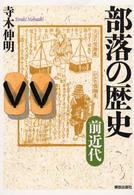- ホーム
- > 洋書
- > ドイツ書
- > Humanities, Arts & Music
- > History
- > 20th century (1914-1955/49)
Full Description
How did 18th-century writers and politicians measure success and power in the ups and downs of European politics? In the history of international relations, the century between the War of the Spanish Succession and the Congress of Vienna is usually considered as a transition period, during which older categories, such as status and rank, glory and grandeur, which had been central to the value system of European court society, were being superseded by "modern", statistically measurable criteria, which supposedly allowed the rational calculation of the states' power resources and clout. The contributions to this volume question this interpretation of a seemingly unequivocal transition from pre-modern to modern criteria in the assessment of international politics.
The book chapters examine how the success of European monarchies and republics on the international stage was observed and categorised in the "long eighteenth century", and how the analytical criteria used by political actors as well as the media changed over time. Here, the emergence of new statistical methods and of entire new media genres that focussed on the analysis of states is discussed as well as the role of status conflicts into the 19th century. Other chapters ask which criteria Enlightenment authors introduced to these debates, and what their impact was when the model function of China was questioned, or the legitimacy of the partitions of Poland discussed. Finally, the volume addresses the question to what degree diplomatic theory and practices continued to hold up premises established in Europe since the peace treaties of Westphalia, or if values and guiding principles of diplomats changed fundamentally over the period under consideration. Rather than replacing old categories by new ones, different political actors and commentators evaluated a plurality of criteria, including the status and rank of rulers, the age of dynasties, the attractiveness of courts, the image of individual rulers, military clout, size of population and territory, in ever-new combinations well into the 19th century.







